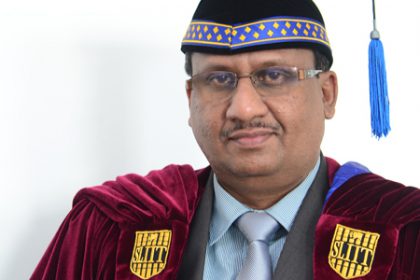
The faculty of Engineering at SLIIT commenced operations in 2008, by conducting the Engineering programme of the Sheffield Hallam, UK.A� In 2013, SLIIT the first institute to receive UKa��s prestigious Institution of Engineering and Technology (IET) accreditation for its IT degree,A�launched its own four year UGC approved Engineering degree programmes in four disciplines; Civil Engineering, Electrical & Electronic Engineering, Mechanical Engineering, Mechanical Engineering (Specialize in Mechatronics) and Material Engineering. In the same year, SLIIT entered into a partnership with the Engineering programme of Curtin University, Australia. Under this partnership, students are given the option of either completing all four years of study in Sri Lanka or transferring to Curtin University, Australia for the final two years. Currently, the engineering students at SLIIT have the option of earning an Engineering degree from SLIIT, Curtin University or Sheffield Hallam University. In addition, this year, the Faculty of Engineering of SLIIT received approval from UGC to award research degrees leading up to MPhil and PhD.
The faculty of Engineering at SLIIT is headed by Prof. Saman Thilakasiri and supported by more than 60 fulltime academic staff members, out of which over 25 are PhD holders in various disciplines of Engineering. Prof. Saman Thilakasiri, Dean a�� Faculty of Engineering, is an alumni of Ananda College and a graduate of University of Moratuwa. Having graduated with a first class honours in Civil Engineering and as the best graduate in Geotechnical Engineering, Prof. Thilakasiri was awarded a Commonwealth scholarship to complete his MSc at the prestigious Imperial College, London. After graduating from Imperial College, UK with a distinction in 1993, Prof. Thilakasiri went onto earn his PhD from University of South Florida, USA. After arriving in Sri Lanka in 1997, Prof. Thilakasiri started his career as a Senior Lecturer at the faculty of Engineering at University of Moratuwa. In the year 2000, he was appointed as the Director of undergraduate studies of the Faculty of Engineering and served in that position for three years. Based on his achievements, he was promoted to the grade of a Professor in 2009.
With many accolades under his name, Prof. Saman Thilakasiri, received the Presidenta��s research award in 2010, received the a�?outstanding research achievement awarda�� from University of Moratuwa from 2007 a�� 2012, obtained the Charter from the Institution of EngineersA� Sri Lanka in 2004, earned the International Professional Engineer status from the Institution of EngineersA� Sri Lanka in 2007, became a Fellow of the same Institution in 2009 and served as Vice President for the Sri Lankan Geotechnical Society in 2015. He has authored more than 50 research papers and two textbooks in Geotechnical Engineering. In 2008 he was awarded a Commonwealth Research Fellowship to engage in research at the Imperial College London and in 2010 he was awarded an Endeavour Fellowship from the Government of Australia to further his research at the Monash University, Melbourne.
Whilst conducting lectures and research at the University of Moratuwa, Prof. Thilakasiri was also involved in national level development projects as a Geotechnical Consultant. His consultancy works are mainly in the areas of soft ground improvement, design of shallow and deep foundations, construction and testing of piles, design of earth retaining systems, and field and laboratory testing of soils. Some of the landmark projects he was involved in include; Colombo a�� Katunayake Expressway, JBIC section of the Southern Expressway, Lotus Tower Project, Altair residencies and the east container terminal at the Colombo Port. At present, he is involved as a Geotechnical Consultant for the extension of the southern expressway and Stage III of the outer circular highway.
Prof. Thilakasiri joined SLIIT in 2014 as a visiting consultant and in June 2015 joined the regular staff of SLIIT as the Dean, Faculty of Engineering. Commenting on the Engineering programme of SLIIT, Prof. Thilakasiri noted, a�?We follow an outcome based education system, a requirement for the Washington Accord accreditation, and through our degree programmes the students are given the necessary skills to practice as competent Engineers who are practical in their approach. Our programmes are structured to produce graduates with strong analytical, problem-solving and communication skills to serve our nation and beyond. Our highly qualified fulltime academic staff guides the students to achieve the aforementioned objectives and the in-house state-of-the-art laboratory facilities add to the excellent learning experience of our studentsa�?.
At the end of the second and third years, it is compulsory that all Engineering students undergo an industrial training for three months. Hence upon graduation, each student would have completed six months of work experience. Academic staff visit students at their placements and continuously monitor the progress of each student.
Elaborating further, Prof. Thilakasiri commented, a�?Our institute is not a place which limits the education of the students to classrooms and laboratories. We provide students with very good library facilities having a large collection of textbooks in all the disciplines and allow access to many international online journal databases. We offer such facilities, in order to enhance our studentsa�� knowledge and encourage them to engage in research. In addition, we provide facilities for our students to engage in various sports and extracurricular activities so that they can earn a wholesome education and graduate as well balanced personsa�?.








